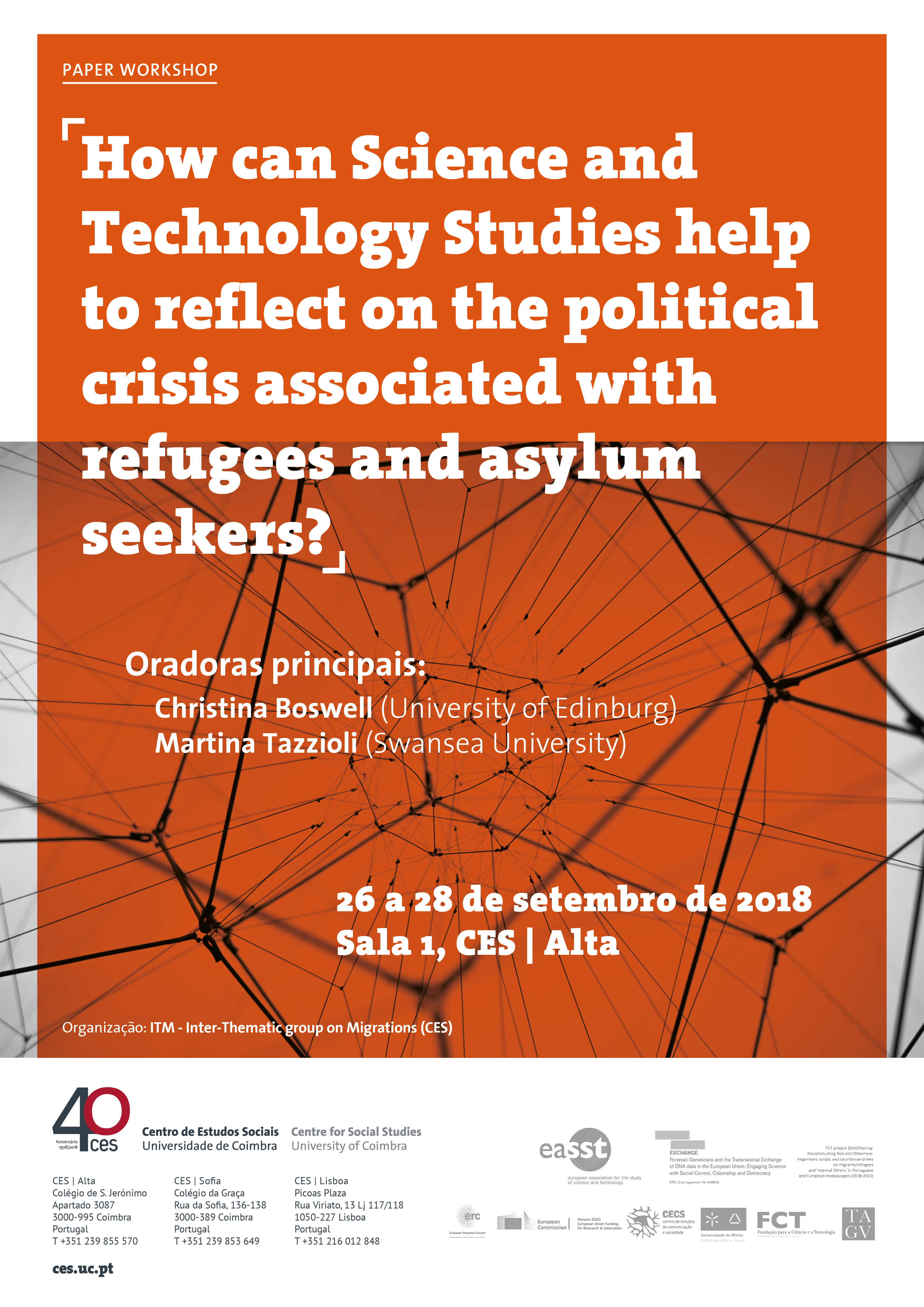Paper Workshop
How can Science and Technology Studies help to reflect on the political crisis associated with refugees and asylum seekers?
September 26 to 28, 2018
Room 1, CES | Alta
Overview
In this workshop we focus on the ongoing political crisis associated with refugees/ asylum seekers/ forced migrants as an object of study. So we ask how Science and Technology Studies (STS) approaches may contribute to understanding the sociotechnical and epistemic aspects of forced migration and displacement, (re)integration, resettlement and related debates and practices. Based on the practice-oriented empirical commitments and conceptual repertoires of the field, various developments and configurations have lent themselves to fascinating STS studies (for instance Boswell 2012; Broeders 2007; Jacobsen 2017; M’Charek 2017; Tazzioli 2017; van der Ploeg 1999). We aim to gather contributions that make use of the theories and problematisations of STS and that may include but not be limited to the following issues:
- border and state surveillance technologies: management of refugees’ mobility;
- objects, infrastructures and spaces: how classifications and standards envisage smooth protocols while producing human suffering;
- digital technologies among asylum-seekers and transportation networks: moral and political capacitation;
- sociotechnical controversies around systems and formulae being devised for asylum-seeker allocation throughout Europe,
- local formats of doing politics at the margins of democracy (e.g. refugee-organised actions in informal camps or detention centres),
- issues of exclusion and orders of visibility: critically explore the positioning of refugees not recognized as humans of their own right in sociotechnical assemblages;
We invite scholars to critically reassess individual research contributions through joint discussion of each draft paper. Abstracts are invited from researchers (including refugee scholars) in the field of STS from a wide array of European countries. Participants are expected to present their own contribution and to be discussant on other papers.
Coupled with the workshop, a science café is planned under the title: “Science and Technology: Helping for refugees’ integration in Portugal?” with inputs from participants and other practitioners in a public space in Coimbra. In 2019, a new invitation will be issued to submit revised/full chapters for peer review, to be compiled in an anthology and afterwards submitted to an international academic publisher.
Confirmed Speakers:
Christina Boswell, University of Edinburg, UK
Martina Tazzioli, Swansea University, UK
Registration Fee and Financial Support:
There is a registration fee of 30 Euros per person covering meals. The workshop is financially supported by the European Association for the Study of Science and Technology (EASST), so that travel and accommodation costs can be partly covered (5 persons can be supported up to 200 Euros). Please indicate in your application if you wish to be considered for a bursary. The workshop receives additional support from CES (University of Coimbra), the EXCHANGE project (executed at CECS, University of Minho and funded by ERC) , and the (DE)OTHERING project (executed at CES and funded by FCT).
How to apply?
Applications should include a short CV (max. 2 pages, including a list of 3 most relevant publications) and an abstract of a paper (max. 500 words with 3-5 keywords) and should be submitted using this form
Important dates:
Selected participants registration: 31st May 2018; Short chapter draft (5-7 pages) submission deadline: 1st September 2018.
Organizers and contact: Nina Amelung (EXCHANGE project, CECS, Uminho) & Gaia Giuliani, Cristiano Gianolla, Olga Solovova, Joana Sousa Ribeiro (ITM group, CES, University of Coimbra). Please direct all your queries to nina.amelung@ics.uminho.pt and cgianolla@ces.uc.pt
References:
Boswell, C. 2012. The Political Uses of Expert Knowledge: Immigration Policy and Social Research. Cambridge: Cambridge University Press.
Broeders, Dennis. 2007. “The New Digital Borders of Europe EU Databases and the Surveillance of Irregular Migrants.” International Sociology 22 (1): 71–92.
M’charek, Amade. 2017. “‘Dead-Bodies-at-the-Border’: Distributed Evidence and Emerging Forensic Infrastructure for Identification.” Pp. 145–64 in Bodies of evidence: Anthropological studies of security, knowledge and power, edited by M. Maguire, U. Rao, and N. Zurawski. Durham, NC: Duke University Press.
Jacobsen, Katja Lindskov. 2017. “On Humanitarian Refugee Biometrics and New Forms of Intervention” Journal of Intervention and Statebuilding 11 (4).
Van der Ploeg, Irma. 1999. “The Illegal Body: ‘Eurodac’ and the Politics of Biometric Identification.” Ethics and Information Technology 1(4):295–302.
Tazzioli, Martina. 2017. “Containment through mobility: migrants’ spatial disobediences and the reshaping of control through the hotspot system.” Journal of Ethnic and Migration Studies, 1-16.


